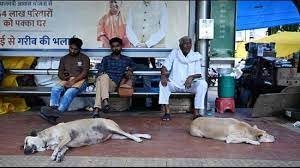New Delhi, September 4, 2023
Introduction
The Municipal Corporation of Delhi (MCD) finds itself embroiled in a contentious situation as it undertakes a controversial operation to relocate street dogs from key locations surrounding the upcoming G20 Summit. Animal welfare activists and concerned citizens have alleged inhumane treatment and illegal actions by MCD officials during this endeavour.

On August 3, MCD issued orders announcing a month-long drive to remove street dogs from at least 50 crucial locations in preparation for the G20 Summit. This decision was met with outrage from animal rights groups who pointed out that there are legal restrictions against exterminating or simply removing community dogs. According to the Animal Welfare Board of India and the Prevention of Cruelty (Animal Birth Control) Rules of 2023, civic bodies can pick up dogs to sterilize them, but they must be released back into the same area after surgery and recovery.
However, after facing backlash, MCD was forced to retract its earlier directive within just two days. Despite the reversal of the initial orders, reports surfaced that the civic body began quietly relocating street dogs, including those that had already been sterilized, on September 1.
Activists Worried
Animal rights activists, including Ambika Shukla of the Sanjay Gandhi Animal Care Centre and Gauri Maulekhi of People For Animals (PFA), have raised concerns about the treatment of these dogs. Shukla stressed that removing already sterilized dogs violates animal birth control rules and questioned the need to remove friendly and gentle dogs. She also highlighted the importance of involving volunteers and caretakers in the relocation process to ensure the dogs’ well-being.
Gauri Maulekhi emphasized that while showcasing the country at events like the G20 Summit is essential, it shouldn’t come at the expense of disregarding the existing animal welfare issues. She pointed out that Delhi lacks effective animal control programs and criticized the Animal Birth Control program for being poorly planned and susceptible to corruption.
Members of the Delhi Animal Welfare Board also expressed concerns. They had suggested the formation of an oversight committee when the initial relocation orders were issued, but now, they claim that dogs are being captured illegally without written orders. They have even provided videographic evidence of MCD workers using unauthorized techniques such as dragging dogs with nooses around metallic rods.
Adding to the complexity of the situation, the MCD appears to lack updated data on the city’s canine population. The last comprehensive survey of community dogs was conducted in 2009, and the population was estimated to be over 560,000 at that time. With the passage of time, it is presumed that this number has only increased.
MCD currently operates 18 Animal Birth Control centers, with the assistance of NGOs and private veterinary doctors, conducting approximately 80,000 to 90,000 dog sterilizations each year.
Conclusion
The controversy surrounding MCD’s actions highlights the need for a balanced approach that considers both the preparations for high-profile events and the welfare of the community’s animals. As concerned citizens and animal rights activists continue to monitor the situation, the fate of Delhi’s street dogs remains uncertain in the lead-up to the G20 Summit.





